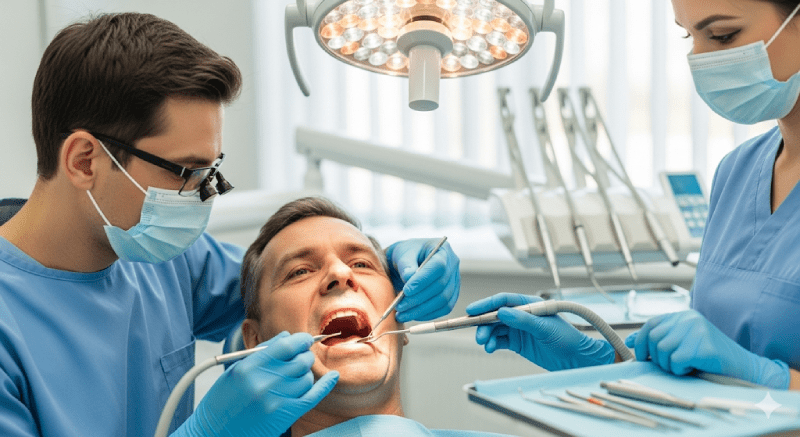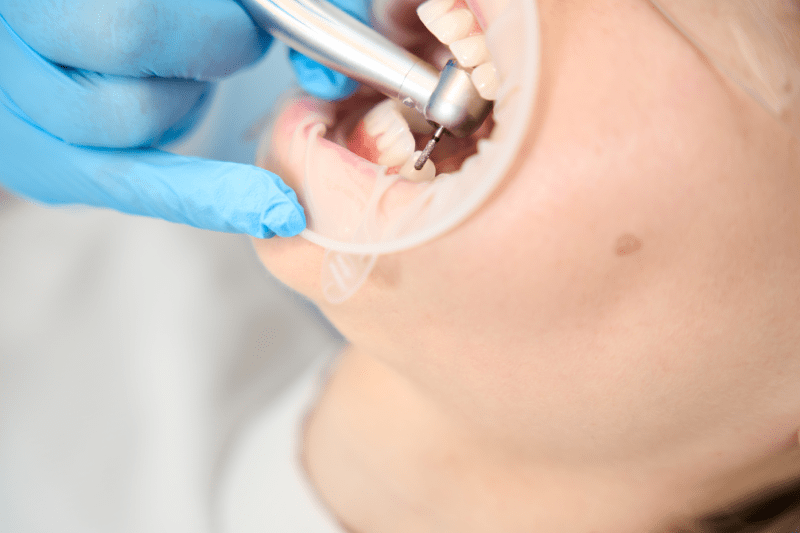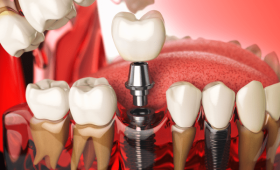What is a Dental Implant and How is It Applied?
A dental implant is an artificial tooth root made of titanium, surgically placed into the jawbone to replace a missing tooth or teeth. An implant functions just like a natural tooth root, providing a stable foundation for a crown, bridge, or denture to be placed on top. It is a permanent solution that fully restores chewing function and aesthetic appearance without damaging the surrounding healthy teeth.
Why Should You Choose Istanbul for Dental Implant Treatment?
Istanbul has become a worldwide popular center for dental implant treatment, thanks to its modern dental clinics, advanced technology equipment, and skilled dentists with international experience. In addition to offering much more affordable prices compared to Western countries, the clinics’ high-quality standards and comprehensive service packages that meet all of the patients’ needs make Istanbul both an economical and reliable destination. This allows patients to receive world-class treatment while also having the opportunity to explore a city rich in history and cultural wealth.
What is the Cost of a Dental Implant in Istanbul?
The cost of dental implants in Istanbul is highly competitive and affordable compared to Europe and North America. The final price depends on various factors such as the implant brand used (e.g., Straumann, Nobel Biocare), the need for additional procedures (bone grafting, sinus lifting), the number of implants required, and the location of the clinic. The most accurate cost information can be obtained during a detailed consultation with your clinic to create a treatment plan specific to your individual situation.
What is Included in a Dental Implant Package?
Many dental clinics in Istanbul offer comprehensive all-inclusive packages for international patients. A typical implant package includes the implant surgery itself, the implant and abutment materials, and the final crown or prosthesis. In addition, to enhance patient comfort, extra services like airport transfers, accommodation arrangements, and an interpreter or patient coordinator to accompany you throughout the treatment may also be included in the package.
How Long Does the Dental Implant Procedure Take?
The dental implant procedure is a two-stage process. The first stage involves the surgical placement of the titanium implant into the jawbone, a procedure that takes about an hour per implant. After this stage, a healing period of 3 to 6 months is required for the implant to fully fuse with the bone (osseointegration). The second stage, the placement of the permanent crown, can be completed within a few days.
Is Dental Implant Surgery Painful?
Since dental implant surgery is performed under local anesthesia, the patient does not feel any pain or discomfort during the procedure. The area is completely numbed, and the dentist works comfortably. After the effect of the anesthesia wears off, it is normal to experience a slight discomfort, swelling, or bruising for a few days. This can be easily managed with over-the-counter or prescribed painkillers, and most patients have a quick and comfortable recovery.
Can Patients with Insufficient Jawbone Get an Implant?
For patients who do not have sufficient jawbone density or thickness, direct implant placement may not be possible. However, modern dentistry can solve this problem with procedures like bone grafting or sinus lifting. Bone grafting involves adding bone material to increase the jawbone volume, while a sinus lift raises the floor of the upper jaw sinus to create enough space for the implant. These procedures make it possible for many patients to get an implant.
What is the Difference Between an Implant and a Bridge?
An implant and a bridge are two common treatment options for replacing a missing tooth. An implant replaces the root of the missing tooth and the tooth itself without affecting the adjacent teeth. A bridge, on the other hand, replaces the missing tooth by using the healthy teeth on either side of the gap as a support. These supporting teeth must be reshaped and covered with crowns. While bridges are a faster and cheaper solution, implants are a more durable and bone-preserving permanent option.
What is the Success Rate of Dental Implants?
The success rate of dental implants is very high, and it is generally over 95% when performed on a suitable candidate by a skilled professional. The success rate depends on factors such as the patient’s overall health, oral hygiene habits, whether they smoke, the quality of the implant, and the expertise of the surgeon. When the implant properly fuses with the bone, it becomes a permanent and stable part of the mouth.
How Do I Choose the Best Clinic in Istanbul for Treatment?
Choosing the right clinic is vital for the success of your treatment. You should do comprehensive research, look for clinics with international accreditations, and read patient reviews and testimonials on independent platforms. It’s a good idea to request to see the portfolio of the dentist’s previous cases and to arrange an online consultation to discuss the treatment plan before making a final decision.
What Are the Different Types of Implants?
The most common type of implant is the endosteal implant, which is surgically placed into the jawbone. There are also subperiosteal implants, which are placed under the gum tissue for patients who cannot use traditional dentures and have low bone height. In addition, there are systems like All-on-4 or All-on-6, which use four or six strategically placed implants to support a full arch of teeth.
What Are the Warranty Conditions for Dental Implants?
Reputable clinics offer a warranty on both the dental implant itself and the prosthetic components like crowns or bridges. The implant component usually comes with a lifetime warranty from the manufacturer, while the crown’s warranty may be shorter, typically between 5 and 10 years. It is very important to get these warranty terms in writing before starting the treatment to fully understand what is covered.
Do Implants Require Special Care?
No, dental implants do not require special care that is different from the care recommended for natural teeth. Brushing your teeth at least twice a day and regular flossing are very important. Special floss can be recommended for cleaning around the implant. Regular dental check-ups are also essential to check the implant and the surrounding gum tissue.
Does Smoking and Alcohol Consumption Affect the Implant?
Yes, smoking and alcohol consumption can significantly affect the success and longevity of a dental implant. Smoking reduces blood flow to the gums and bone, making the healing process and the implant’s fusion with the bone more difficult. It also increases the risk of gum disease. It is strongly recommended to limit or completely quit smoking and alcohol before and after the procedure.
How Are Missing Teeth Replaced with Implants?
An implant can effectively replace a single missing tooth or multiple teeth. For a single tooth, one implant is placed and a crown is attached to it. For multiple missing teeth, a few implants can be used to support a dental bridge. In cases where all teeth are missing, systems like All-on-4 or All-on-6 are used, where the entire arch of teeth is supported by strategically placed implants.
What Are All-on-4 and All-on-6?
All-on-4 and All-on-6 are full-arch dental implant solutions that provide permanent and stable new teeth. In the All-on-4 procedure, a complete arch of teeth is supported by only four dental implants, while six implants are used in the All-on-6. These systems are ideal for patients who have lost most or all of their teeth and provide a fixed, non-removable solution that feels and functions like natural teeth, restoring both chewing function and a beautiful smile.
What is the Recovery Process Like After Implant Surgery?
The initial recovery period after implant surgery usually lasts a few days. You may experience swelling, bruising, and slight discomfort, which can be managed with medication. It is recommended to eat soft foods for the first few days and avoid applying chewing pressure on the area where the implant was placed. The full recovery process where the implant fuses with the bone, known as osseointegration, can take several months.
Is the Brand of Dental Implants Important?
Yes, the brand of the dental implant is very important. Reputable and internationally recognized brands like Straumann, Nobel Biocare, and Alpha-Bio Tec are often preferred. These brands have a proven track record of success, have been extensively researched, and are made from high-quality, biocompatible materials. Choosing a well-known brand also ensures that you can get replacement parts or follow-up care from a dentist anywhere in the world.
Do Implants Get Cavities?
No, a dental implant, being an artificial titanium device, cannot get cavities. However, the natural teeth surrounding the implant are still susceptible to decay, and if proper hygiene is not maintained, the gum tissue around the implant can become infected. It is very important to continue brushing, flossing, and visiting your dentist for routine check-ups to ensure the health of your entire mouth.

Is a Pre-travel Consultation Necessary?
Yes, an online pre-travel consultation is highly recommended and is often a prerequisite. During this consultation, you can discuss your medical history, and the dentist can evaluate your situation by examining your digital X-rays and photos. This allows the clinic to create a preliminary treatment plan, provide you with a cost estimate, and ensure that you are a suitable candidate for the procedure before you make any travel arrangements.
What Are the Risks of the Implant Procedure?
While dental implant procedures are very safe and have a high success rate, there are some risks, as with any surgical procedure. Potential risks can include infection at the implant site, damage to surrounding tissues like other teeth or blood vessels, nerve damage that can cause numbness, or the implant’s failure to fuse with the jawbone. Choosing an experienced and certified surgeon and a reputable clinic significantly reduces these risks.
Can I Get My Crown on the Same Day as the Implant?
In some cases, a temporary crown can be placed on the same day as the implant surgery in a procedure known as “immediate loading.” This is an option for patients who have sufficient bone density and meet certain criteria. However, for most patients, a permanent crown is placed after a healing period of several months to allow the implant to properly fuse. This is a very important step for long-term success.
How Are Travel and Accommodation Arranged?
Many dental clinics in Istanbul have dedicated patient coordinators who can assist with all travel logistics. These services often include airport transfers, hotel reservations, and a personal interpreter or guide to accompany you during your stay. This comprehensive support is designed to make the experience stress-free and allow you to focus entirely on your treatment and recovery.
What is the Difference Between Titanium and Zirconium Implants?
The main difference lies in their material and properties. Titanium is the traditional and most common material for dental implants due to its proven strength, biocompatibility, and ability to bond well with bone. Zirconium implants are a newer, metal-free alternative that is white in color and has a more aesthetic appearance, especially for patients with thin gums. While zirconium is also strong, it can be a more expensive option.
Can Implants Be Done Under General Anesthesia?
Dental implant procedures are usually performed under local anesthesia. However, for patients who have dental phobia or are undergoing a more complex procedure like a full-mouth restoration, the dentist may recommend sedation or general anesthesia. Sedation helps you relax and feel drowsy, while general anesthesia puts you into a deep sleep, ensuring you feel no pain or discomfort and won’t remember the procedure.
What is the Follow-Up Process After I Return Home?
The follow-up process after you return home is very important for the long-term success of your implant. Your clinic in Istanbul will provide detailed aftercare instructions and may offer remote consultations to check on your progress. It is also important to visit a local dentist for regular check-ups to ensure your implant and overall oral health are properly maintained.
How Can I Pay for the Treatment?
Payment methods may vary from clinic to clinic. Most clinics in Istanbul accept international credit cards, bank transfers, and cash payments. It is important to confirm the accepted payment methods and currency exchange rates with the clinic’s patient coordinator before you arrive. This will prevent any issues with payment.
Do I Have to Stay in Istanbul for a Long Time?
Your total stay in Istanbul depends on the complexity of your treatment. For a single implant placement, a stay of 3 to 5 days is usually sufficient for the initial procedure. For more comprehensive treatments like All-on-4, the first visit may take about a week. You then return a few months later for the final prosthesis, which can be completed in a few days.
Is It Safe to Travel to Istanbul for Medical Treatment?
Yes, it is very safe to travel to Istanbul for medical treatment. The city has a well-developed infrastructure for medical tourism, with reputable clinics adhering to strict international hygiene and safety standards. Istanbul is a major tourist destination and has a stable and welcoming environment for visitors.
What is the Difference Between an Implant and a Crown?
An implant is the artificial tooth root that is placed into the jawbone. A crown is the visible part of the tooth that is placed on top of the implant after it has healed. The implant provides a stable foundation, while the crown provides the aesthetic and functional part you use for chewing. They are two different components of a complete tooth replacement system.



